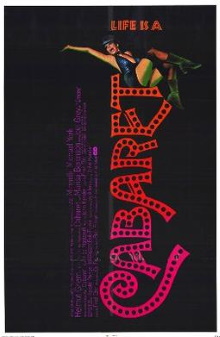Cabaret is another famous musical with particularly iconic imagery featuring Liz Minnelli sitting behind a chair. However unlike other musicals, you never hear its songs being played outside of the show itself. Watching this, I understand why. The songs themselves are nothing special but combined with the visuals and dance choreography, each has a unique effect. Similarly, the film affects a tawdry, tasteless look but actually harbors surprising emotional depth and insight.
A British academic Brian Roberts arrives in Berlin in 1931 to finish his doctorate and earn a living by teaching English. His search for suitable accommodation brings him to the boarding house where American cabaret dancer Sally Bowles is also staying. They quickly become friends and though Sally tries to seduce him, he demurs saying that he has had bad experiences with other women. One of Brian’s students, Fritz Wendel, is a fortune-hunting gigolo who learns that another one of Brian’s clients is a rich heiress from the Jewish Landauer family and is determined to pursue her. After Brian consoles Sally about her absent father who she frequently talked about but is never seen, they do become lovers. So he is dismayed when she meets with a rich German playboy aristocrat who seems intent on pursuing her. Meanwhile the Nazi Party becomes increasingly influential in Germany, casting a pall on everything that goes on in the city.
Unmentioned in the synopsis above is the unnamed Master of Ceremonies of the Kit Kat Club where Sally performs, yet he actually is a major character as he is the singer of many of the songs in here and his interjections act as a sort of social commentary on what is going on. As I mentioned, the songs themselves would be unremarkable if you happen to just hear them, but the effect of the song-and-dance performances is electric especially as they are always relevant to the story. I especially love the setting which feels like a short-lived interregnum as we know that the Nazi Party’s seizure of power is imminent and inevitable. Under this climate of fear, Sally and Brian’s escapades and sexual affairs feel like a last gasp of Bohemian excess before the curtain comes down for all of them. The film doesn’t pull any punches at all. Even as the show goes on inside the club and everyone is laughing in delight at stupid jokes, looking like they almost desperate to have fun, Nazi thugs are beating and killing those they hate outside and eventually they become mainstream enough to come for Sally and Brian’s friends as well.
I also love that this is a film of layers and layers. The Kit Kat Club sells itself as an escapist hideaway where you can forget your troubles with beautiful girls, glamorous costumes and music. Yet it barely bothers to hide how the girls are really rather tawdry under the bad makeup or not really girls at all, or the bad accents or the desperate edge in the audience’s attempt to find merriment despite the deteriorating state of society outside. But there is still yet another layer as the songs and lyrics actually do provide insightful commentary and incisive critique as you can see in the Master of Ceremonies skit about falling in love with a monkey. Similarly Sally Bowles is a lady of hidden layers. Sure she seems like she’s only living for the moment and has the shallow ambition of becoming a movie star. Yet she isn’t a bad person in seeming to genuinely want the best for her friends and is self-aware enough to understand that she would never be happy with Brian’s offer of a normal life. Her last song appears to hint that her background is entirely made up as well. The same pattern applies to Fritz’s side story and even the Nazi Party with its seemingly wholesome song extolling the beauty of nature and the renewing power of youth.
Personally I wasn’t expecting too much when I added this to my list, thinking that it is perhaps a standard musical with some erotic themes. It is nothing of the sort, being instead a highly sophisticated film lurking underneath a superficial veneer of crassness, featuring unique song and dance numbers and all taking place in a fascinating setting. This film was originally given an X-rating when it was first released but not because it is pornographic. Instead, it was far ahead of its time in its frank and realistic treatment of selling sex, homosexuality and a cynically hedonistic lifestyle.
